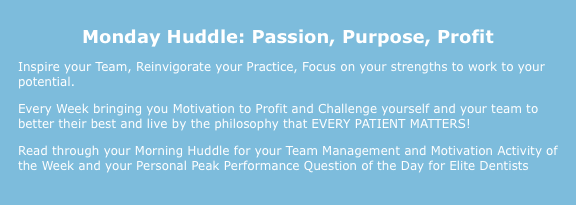I hope you walked away from last week’s Huddle with a passion and a determination for your “mission” that you own and are responsible for every single day. We are going to talk about ‘your mission’ in the coming weeks.
Today, I’d like to take your Mission Discussion and expand on it in hopes to make sure you and your team have achieved laser focused clarity on your objectives for each day.
Then we’ll flip it over and talk specifically about how to help your patients develop and follow through on their missions next week which will be even more fun.
Here’s the big point about last week: your mission can’t be just to be the best you possible… always positive, a great attitude, focused, collaborative with your team members, and of course a helpful leader with your patients.
Those are great things and I have no doubt you embody all of those. I’m sure you are the one who walks every day ready to do deliver on your purpose and do a “great job.”
That said, it is critical that we elaborate on and articulate specifically what a “great job” actually is.
Here’s a couple obvious examples that you can’t hear too often.
If you are answering the phone, a great job could be not letting it ring too many times, avoiding putting new patients on hold, it most certainly is scheduling a successful new patient appointment.
Here’s the thing, it would be very easy to get caught up in the activity of ‘answering the phone’ and forget what the point of every phone call is.
When patients ask questions and you answer but then they hang up and no appointment is scheduled, you failed at your mission.
If you consider your mission patient education – that’s great – but to what end? What’s the point of it?
We know our mission around patient education is not just to ‘inform’ a patient, it is also to inspire, influence, motivate, and so many other things.
You can read a text book about health or you can be a part of the process of actually getting healthy.
This is vital to the understanding of what a successful patient engagement would look like on your mission.
And moreover, I can tell you that one of the biggest ways Doctors screw up what they think they are doing right is when they diagnose for the sake of diagnosing instead of with a purpose to move the patient toward health.
Of course, diagnosing is the clinical responsibility of the Doctor. However, what good does it do if the treatment stays in the chart versus move into the patient’s mouth.
Again, what would seem like the same mission and yet the result is a very different outcome. Which actions are leading to the achievement of the mission versus just the activity of the process.
In your role and position in the practice, I’m asking you today to talk about where you might be mistaking activity for accomplish. Where do our actions miss the mark?
When you are rushing to stay on time but at the expense of the clinical yes, the final triangle of trust, and the consultative close that helps a patient accept, pay, and schedule then we missed the point. All the ‘staying on time’ in the world doesn’t help more patients get healthy or you to realize your ultimate mission.
So, if we stated that our mission is to help patients, we want to do it in a way that keeps everyone on time but without it being at the compromise of the completeness of the patient experience.
Now we outline the actions that achieve the desired outcome of the mission instead of be confused by the mission being the actions.
The bottom line is: it’s not enough to be “on a mission” – you want to be on the RIGHT mission and align everything to make that possible.
This is when things get exciting and you get to act with purpose. Your confidence will grow and you will be a better professional, team member, and leader for your patients (which, by the way, that leads to a better leader in all other areas of your life too).
I’ll leave you with one final thought, just to complicate the matters and open it up to your team discussion. All too often, when a team member is focused on their mission without keeping the perspective of the overall practice goals in mind (which is what should determine and be interconnected with your own mission), they become too busy doing their thing that they miss out on helping everyone else win and achieve the practice mission as a whole.
It’s very important that part of being a great team member is always helping everyone else win. The bigger picture of the mission trumps the small activities of the tasks.
This often happens when someone is busy doing insurance but a patient needs to be checked out and pay. This happens when a patient needs moved or a treatment opportunity is available but someone is too rigid with their day or preferences that we lose the opportunity.
Now that we’ve defined your mission, we want to make sure it fits into the right mission for the overall practice success and we want to look at how each team member can better support each other on their path to victory and success every day.
Together we can all win in bigger ways than we can individually.
Next week, we’ll help your patients define their missions too and make your ‘job’ a whole lot easier in the process.



